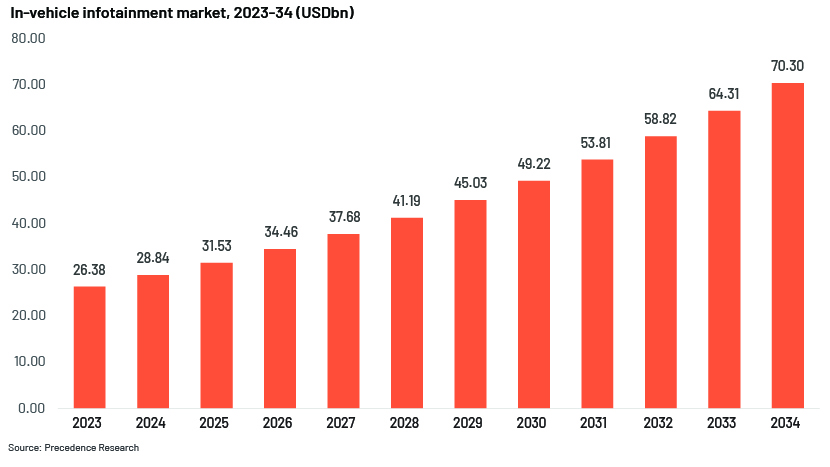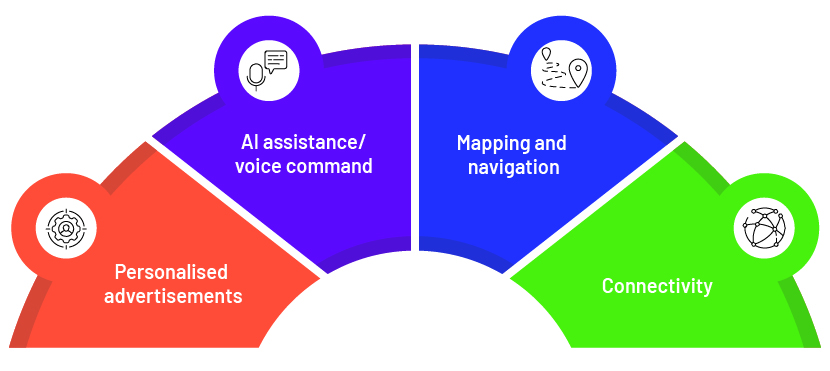Published on June 16, 2025 by Twinkle Karnawat
Vehicles have become an indispensable part of our daily existence, as evidenced by the thriving sales of new vehicles. With growing demand and rising technological expectations, in-vehicle infotainment has emerged as a core differentiator. Passenger-car sales reached approximately 77.7m units in 2024 and are estimated to reach 98m units by 2029, according to Statista.
With tech innovations such as the use of AI assistants and AI agents in the simplest of tasks, consumers now prefer simpler and convenient options. When it comes to vehicles, they attach significant importance to in-car infotainment such as hands-free calling, playing music, GPS navigation, traffic alerts, weather updates and even gaming. The global in-car infotainment market was worth USD28.84bn in 2024 and is projected to grow at a CAGR of 9.23% to USD70.3bn in 2034, according to Precedence Research.

Evolving mobility tech is putting a lot of importance on connectivity; for example, the vehicle-to-everything (V2X) segment is evolving, enabling vehicles to connect to other vehicles, pedestrians, infrastructure and, most essentially, with homes. With one click from the car, a user can now ask the coffee machine at home to freshly brew a cup of coffee. Additionally, as consumers adopt AI functions, AI is also adapting to users’ needs and providing personalised recommendations. For example, in January 2025, Mercedes-Benz and Google partnered to enhance E-Class drivers' experience, enabling natural-language conversations with MBUX Virtual Assistant for Google Maps, enabling contextual interactions and continuous dialogue during journeys.
2025 trends in in-vehicle innovations in the mobility sector
The mobility sector is experiencing rapid transformation, especially in the in-vehicle infotainment market, impacted by trends such as AI, the internet of things and sensor technology. The following are some of the major trends impacting in-vehicle infotainment:

1. Personalised advertisements:
| In 2024, Ford patented a system to use consumers’ information inside the car for a personalised in-car experience. It uses data such as location, in-car conversations and repetitive habits of consumers in the car to provide customised ads on similar lines. For example, if the driver is passing an IKEA store, an ad for the IKEA sale, etc., will come up. |
2. AI assistance/voice command:
| To make the in-car experience better, Volkswagen has added ChatGPT to its cars. By using voice assistant, users can manage tasks such as navigation, ask common questions or resolve any situation that arises while driving. This also helps when planning a trip. | |
| Mercedes-Benz has also added generative AI to its in-car voice assistant MBUX for a customised experience. For example, it plays the morning news when the user sits in the car, or it can suggest joining a meeting via video conferencing if the meeting is recorded on the calendar. | |
| Another example is Polestar, which uses Android Automotive OS to enable drivers to use Google Assistant to control battery level, temperature, etc. | |
| Simple tasks such as ordering food, making dinner reservations or conducting banking transactions can now be completed via voice command. For example, SoundHound AI (a voice AI company) plans to launch a voice commerce ecosystem this year. It is collaborating with auto makers and restaurants to incorporate voice ordering features in cars. |
3. Mapping and navigation:
| AI algorithms improve digital map creation by increasing update frequency and efficient map generation to improve the user experience. For example, HERE Technologies has introduced UniMap, an AI-driven technology for fast sensor data processing and frequent map updates. |
4. Connectivity:
| With evolutions such as Matter (a standard for smart-home technology that allows interoperability), connecting devices from different brands such as Google, Apple, Samsung or Amazon, it is becoming easier to make use of gadgets. | |
| In January 2024, Samsung partnered with Hyundai on its SmartThings platform to integrate smart-home technology with connected vehicles. This enables remote management of vehicle functions such as starting, air conditioning and monitoring charging status; users can also control home appliances such as washing machines and TVs from their vehicles. | |
| LG Electronics has unveiled its LG Mobility Experience (MX) platform. This solution integrates LG's smart-life technologies with mobility, transforming the in-vehicle experience into providing a home-on-vehicle facility. |
Outlook for the infotainment sector

Conclusion
In-car infotainment has become an integral part of the mobility ecosystem. Tech-driven driving experiences are flourishing due to increasing demand for convenience and personalised experiences, with many willing to pay a premium for customised vehicles. Auto makers such as Tesla, Hyundai and BMW are pushing to add more and more features. Similarly, tier 1 suppliers such as software providers, including Creance and SoundHound, are working to provide enhanced in-car experiences – from small tasks such as playing preferred music to making banking transactions.
How Acuity Knowledge Partners can help
We offer a wide range of services to help clients navigate rapid advancements in mobility technology. Our team of technology research experts collaborate with Fortune 500 companies, mid-size firms and innovative startups to provide strategic insights that keep them ahead of trends in the mobility sector such as in-car infotainment, connected vehicles, micromobility, mobility-as-a-service (MaaS), vehicle-to-everything (V2X) and advanced telematics leveraging AI and IoT solutions. Our services cover the entire lifecycle, from strategic research and corporate finance to M&A and sales and marketing, ensuring tailored solutions for each client's unique needs.
Sources:
-
Market size: https://www.precedenceresearch.com/in-vehicle-infotainment-market
-
Mercedes and Google: https://carbuzz.com/mercedes-ai-driven-voice-assistant-navigation/
-
Ford: https://www.motortrend.com/news/ford-in-vehicle-advertising-patent/
-
Polestar: 8 Car Brands With The Best Built-In Voice Assistants
-
HERE Technologies: 6 technology trends that drive automotive mapping and navigation - GPS World
-
Bosch: https://techcrunch.com/2024/01/08/ces-2024-bosch-eye-tracking-espresso-poi/
-
SoundHound AI: https://www.voices.com/blog/soundho
-
Mercedes-Benz and Google are making good on their partnership to enable drivers of the E-Class and other Mercs to have natural-language conversations with the MBUX Virtual Assistant to use Google Maps. Effectively, it gives new conversational capabilities to Mercedes' infotainment system to explore and use Google Maps Platform, including a memory, so the AI system can continue a conversation on a journey and reply in context.unds-ai-voice-commerce-platform-revolutionizes-in-car-ordering/
-
BMW: https://www.bmwgroup.com/en/news/general/2025/newidrive.html
-
AFEELA: https://insideevs.com/news/746327/sony-honda-afeela-ces-preview/
What's your view?
About the Author
Twinkle Karnawat is a part of Acuity Knowledge Partners – Corporate & Consulting team with experience in strategy building and business research. She has executed various projects including go-to market strategy, competitive intelligence, growth strategy, market sizing, as well as provided strategic recommendations to clients across various technologies including mobility tech, digital health, edtech and cleantech. Twinkle holds an MSc. in International Business Economics and Finance from the Gokhale Institute of Politics and Economics, India, and has a bachelor’s degree in economics honours from St. Xavier’s College, India.
Like the way we think?
Next time we post something new, we'll send it to your inbox







